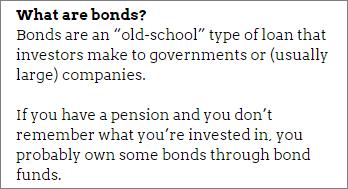 See why 4thWay now accepts ethical ads.
See why 4thWay now accepts ethical ads.
P2P Lending Funds, Bonds and Shares
This is the first article in a new series for 4thWay®, covering investment on the edges of P2P lending.
That means alternative ways to invest in the P2P lending sector without lending directly to borrowers yourself. These might either help you spread your risks, manage your portfolio of loans or increase your gains.
To kick off the series, we'll just give you a quick summary of the three key ways you can do this:
1. P2P lending funds
There are at least three P2P lending funds: investment funds that specialise in profiting from P2P lending and other non-bank lending.
P2P Global Investments Trust is a fund listed on the stock market, which means you buy shares in it in order to take part in the fund.
It invests in business loans through P2P lending companies and other non-bank lenders, and is hoping for 10% annual returns.
How trusts listed on the stock market work
Since P2P Global is listed on the stock market, its share price can move higher or lower than the loans it invests in, which means that, even if it achieves its 10% target, you might make more or less.
Take this (simplistic) example: its shares are valued at 100p and it achieves 10% interest by lending its funds. Investors in the trust are pleased with the returns, so more of them buy more shares in P2P Global Investments Trust.
This demand from investors pushes up the share price of the trust to, say, 120p. But P2P Global is still earning a 10% return on 100p, so those investors who bought at 120p are getting the equivalent of 8.3% on account of paying a higher price to invest.
Conversely, demand could sink, perhaps due to a bad year, giving smart investors a chance to buy at a bargain price.
Investors in funds listed on the stock market will pay commission to buy and sell. They'll also pay an annual fee and the fund's expenses as well.
Other investment trusts
VPC Specialty Lending Investments, is very similar to P2P Global, investing in P2P loans and potentially other “online”, electronic platforms.
It might not just lend; its remit allows it to buy shares in some P2P lending companies as well. It could potentially negotiate deals to help fund fast growing P2P lending companies in their early stages.
The best known fund in the UK is probably GLI Finance, aka “GLIF”, which is also a trust listed on the stock market. As with VPC, it both invests in loans and buys shares in the P2P lending companies themselves. It also targets 10%+ returns per year.
Other investment funds are also partly investing in P2P by buying shares in the above three funds. This includes funds run by the best-performing fund manager in the UK, Neil Woodford.
2. Lend to P2P lending companies
There  are also opportunities to lend to the P2P lending companies themselves.
are also opportunities to lend to the P2P lending companies themselves.
Wellesley & Co.* is the most renowned for this, heavily selling its retail and mini bonds in order to expand and fund more loans to borrowers secured against property.
You can earn higher interest rates because the risks are higher, due to lending to just one business – the P2P lending company – instead of lots.
Mini bonds can earn you even more than retail bonds, since they're not regulated and you can't so easily sell those bonds to exit the loan early.
Since you're not lending to the borrowers but to a single business it can make sense to treat it like one loan, and remember to diversify some more by lending to multiple borrowers through several P2P lending companies' websites.
3. Buy shares in P2P lending companies
Assetz Capital, a business and property P2P lending website, recently completed a round of funding through Seedrs, the crowdfunding website, where it sold several million pounds worth of shares to individual investors.
LendInvest, another property P2P lending company, is looking to list on the London Stock Exchange in the near future.
Buying shares, particularly in start-ups, is considerably more risky than P2P lending, and it requires an awful lot of confidence and knowledge, but the returns can also be significantly higher.
*Commission, fees and impartial research: our service is free to you. 4thWay shows dozens of P2P lending accounts in our accurate comparison tables and we add new ones as they make it through our listing process. We receive compensation from Wellesley & Co., and other P2P lending companies not mentioned above either when you click through from our website and open accounts with them, or when you make an investment, or to cover the costs of conducting our calculated stress tests and ratings assessments. We vigorously ensure that this doesn't affect our editorial independence. Read How we earn money fairly with your help.


